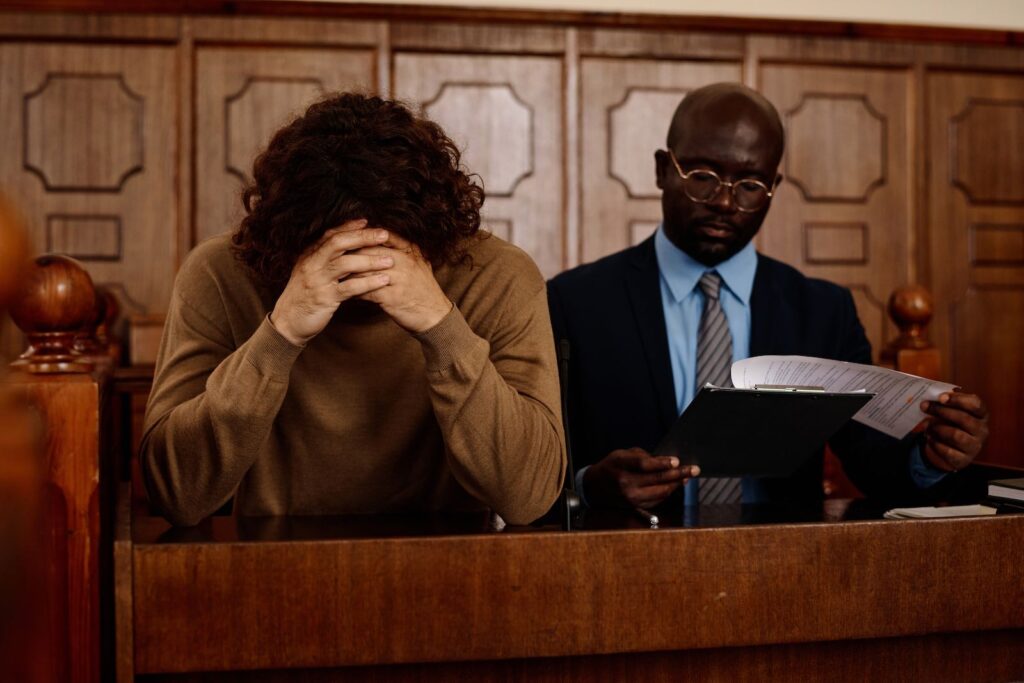If you’re wondering what a defense attorney does, you’re not alone. Their role is to defend those accused of crimes, a vital position that balances scales of justice and protects individual liberties. In this article, we shine a light on the role of the defense attorney, from legal strategizing and evidence analysis to championing the rights of the accused. Learn about the profound impact these legal defenders have without diving into convoluted legal theory—essentially what you need to know, distilled.
Key Takeaways
- Defense attorneys are vital for a fair trial, ensuring the accused are represented, and their rights are protected, and helping them navigate the complex legal system from investigation through to trial.
- A strong defense strategy involves gathering and analyzing evidence, challenging the prosecution’s case to create doubt, and sometimes negotiating plea deals to minimize negative outcomes.
- Post-verdict, defense attorneys play a crucial role in supporting their clients through appeals, expungement processes, and handling the impacts of conviction to facilitate their reintegration into society.
Defining the Role of a Defense Attorney
In the realm of criminal justice, a defense attorney plays an essential role. Defense attorneys are crucial for ensuring justice by:
- Acting on behalf of the accused
- Protecting their clients’ legal rights
- Providing skilled and competent defense strategies
- Explaining intricate legal options
- Determining optimal actions in mounting a defense
A defense attorney is a staunch advocate for their client despite formidable challenges.
An experienced criminal defense attorney not only represents individuals in court, but also safeguards their constitutional rights. They act as:
- A bulwark against potential overreach during criminal prosecution
- Require ongoing education to stay abreast with legislative updates, enabling a comprehensive understanding of prevailing laws.
An experienced lawyer’s dedication to their clientele reaches beyond courtroom appearances—they vigorously defend client interests throughout the entire process of criminal investigations and work diligently to secure fair trial conditions.
Ensuring Legal Representation
Defense lawyers serve a critical function in the justice system, offering essential legal representation and counsel to individuals charged with crimes during all phases of court proceedings. Even highly intelligent people can be unprepared to manage their own defense without the specialized knowledge that a trained attorney brings. The necessity for skilled legal advocacy is underscored, especially when what’s at risk is as significant as personal liberty.
Protecting Client Rights
A defense attorney acts as a staunch protector of the Constitution when an individual faces criminal charges. They ensure that throughout legal proceedings, the state maintains respect for the rights of those accused. Their critical function includes defending clients from unconstitutional practices by law enforcement officers, such as unauthorized searches and forced admissions.
More than just legal counsel, defense attorneys are ardent defenders against overreach by police authorities including infringement on rights or application of coercive techniques. From beginning to end, they advocate relentlessly for the maintenance of all constitutional protections to assure equitable treatment within our judicial system for people who have been charged criminally. Duties central to a defense attorney’s role include:
- Offering informed legal advice and assistance
- Investigating details pertinent to cases while collating evidence
- Strategizing robust defenses
- Providing courtroom representation
- If suitable, negotiating terms for plea agreements
- Highlighting instances where there may be faults in how evidence was collected or mishandled during police procedures
Through these responsibilities effectively executed, defense attorneys often have considerable success in undermining allegations brought forth by prosecutors, which could lead even toward case dismissals.
Navigating the Court System
Navigating the court system can be a daunting experience for anyone. Defense attorneys play an essential role in helping clients grasp the complexities of the criminal justice system, guiding them from their arraignment to trial. They are instrumental during the bail and pretrial release phases, where they champion equitable terms and explore options other than incarceration.
In offering exhaustive legal counsel, defense attorneys ensure that their clients are well-informed at each stage of criminal proceedings, aiding them in making decisions with clarity and understanding of potential outcomes within the justice system.

Crafting an Effective Defense Strategy
An effective defense strategy forms the cornerstone of a successful criminal defense, entailing:
- Introducing evidence before the court,
- Constructing an engaging narrative that frames the defendant’s actions in a way that resonates with the jury,
- Employing tactics aimed at expediting case settlements to reduce possible punishments and incarceration duration for clients.
Defense attorneys are instrumental in creating reasonable doubt by meticulously scrutinizing and contesting the prosecution’s evidence. They highlight discrepancies and apply various defensive techniques. The essence of providing competent defense rests on their proficiency to dissect every aspect of what has been presented against their client, examine all available evidence thoroughly, and develop an alternative story that casts uncertainty on any claims of guilt leveled at the defendant.
Gathering and Analyzing Evidence
An effective defense strategy is rooted in the meticulous collection and examination of evidence. Defense attorneys are tasked with several critical actions.
- Examining the evidence put forward by the prosecution
- Performing comprehensive investigations to amass Evidence
- Acquiring extra evidence that strengthens their client’s case
- Critically evaluating forensic evidence applications
- Potentially recreating crime scenes to uncover any missed pieces of physical proof
In today’s digital era, these legal defenders also turn to social media and online inquiries as pivotal tools. Such platforms can yield essential physical evidence or offer up crucial information utilized in counteracting false accusations.
Challenging the Prosecution’s Case
In the face of a prosecution’s case, triumph requires adept strategic maneuvers, thorough attention to detail, and an extensive knowledge of the law. Criminal defense attorneys are particularly skilled at:
- Highlighting weaknesses in the evidence provided by the prosecution
- Examining eyewitness accounts for accuracy and potential prejudices
- Introducing counter-evidence that challenges claims made by the prosecution
- Raising questions about whether or not there is any doubt concerning a defendant’s guilt
- Suggesting different scenarios regarding how a crime may have occurred
- Demonstrating instances where an accuser may be lying
To cultivate reasonable doubt and question if evidence should even be admitted, defense attorneys deploy myriad tactics ranging from substantiating alibis to advocating defenses based on necessity or self-defense. They remain steadfast guardians of justice by ensuring compliance with legal requirements like the Brady rule while rigorously searching for constitutional violations within their client’s case proceedings.
Negotiating Plea Agreements
Sometimes, the most advantageous strategy for a defense is to arrange a plea agreement. Defense attorneys work diligently to negotiate decreased sentences, reduction or dismissal of charges and strive for lighter charges in favor of their clients. Nevertheless, taking a plea deal usually means confessing guilt which could result in enduring consequences like an unchangeable criminal record and restricted chances to contest the accusations without being proven guilty.
In such situations, the skills of a competent defense attorney become critical as they endeavor to achieve resolutions that may offer options other than jail time—such as parole or probation.

The Importance of Attorney-Client Confidentiality
At the heart of the bond between a client and their defense attorney lies trust, established on the tenet of attorney-client confidentiality. This vital principle ensures that clients can communicate openly and thoroughly, which is indispensable for a defense attorney to provide an effective defense.
The safeguarding of confidential communications between clients and attorneys stands as a crucial legal doctrine that upholds confidence in our justice system among the public.
Building a Trusting Relationship
Defense attorneys cultivate a strong bond with their clients by actively addressing and engaging in the client’s issues, not just by keeping confidentiality. Trust is established through the sincere management of the client’s expectations and ensuring that there are always open channels for communication, which enhances the attorney-client relationship.
Maintaining Privacy
Maintaining privacy is a fundamental aspect of the attorney-client relationship. This is safeguarded by the principles of attorney-client privilege and work product doctrine, which are established to protect the secrecy of communications between attorneys and their clients. The rule known as attorney-client confidentiality prohibits lawyers from revealing any information concerning their legal representation unless they have received explicit consent from their client.
This obligation to keep client information confidential continues even after the legal representation has concluded, lasting indefinitely. As a result, sensitive issues such as outcomes from an unsuccessful polygraph examination remain private and do not need to be shared with law enforcement or other entities. These provisions enable clients to fully confide in their attorneys regarding every detail necessary for their case without concern for unnecessary exposure of that information.
Addressing Special Types of Charges
In certain instances, defense attorneys must tackle unique charges in a criminal case stemming from complex relationship disputes. These serious accusations often relate to domestic violence or sex crimes, typically surfacing amid acrimonious divorces and can profoundly influence the results of custody battles or divorce proceedings.
Defending Against Serious Allegations
Individuals are often wrongfully accused of serious offenses, including child abuse and domestic violence, due to a variety of reasons such as:
- animosity
- vengefulness
- misunderstandings
- misidentification by witnesses
- overstated opinions from experts
- inappropriate actions by officials
- implanted or inaccurate memories
We must develop defense approaches that specifically address the unique aspects of these erroneous claims.
For instance, in situations where someone is unjustly charged with child abuse, lawyers might question the validity of the accusations. This is particularly pertinent when issues arise within dysfunctional family settings or during contentious custody battles over children. The lawyer’s job transcends merely disproving the allegations. They must also shield their client from the detrimental repercussions that can follow such grave charges.
Representing Vulnerable Populations
When advocating for young individuals, defense attorneys must adopt a specialized strategy that acknowledges the distinctive challenges of representing this group. They must understand that juveniles are not merely small-scale adults and require an approach informed by their developmental stage—including a recognition of their limited impulse control and heightened vulnerability to peer pressure.
To mount an effective defense for minors, lawyers should:
- Adapt legal tactics to align with juvenile cognitive and behavioral development.
- Make judges aware of these important developmental considerations throughout all stages from pre-trial through sentencing.
- Employ scientific findings on youth development in constructing their arguments.
- Argue convincingly about the minor’s potential for reforming themselves
- Place the actions of these younger clients into the proper perspective
Incorporating such strategies enables those who represent young people in court—their advocates—to champion what truly serves each minor’s welfare most effectively.
Supporting Clients Beyond the Verdict
The responsibilities of a defense attorney extend beyond the outcome in court. Their contribution to post-verdict support, including advocating after the trial and dealing with the repercussions of a conviction, is crucial for both the case’s final results and their client’s subsequent life.
Post-Trial Advocacy
Advocacy after a trial involves managing appeals and representing clients during post-conviction challenges. Defense attorneys assist clients with expungement, the process of legally hiding criminal records from public scrutiny, thereby facilitating their reintegration into society and helping them leave their past behind.
The complexity of the expungement procedure differs across jurisdictions and some offenses may not qualify for it. The specialized knowledge of defense attorneys is crucial in tackling these intricacies, exemplified by initiatives such as Clean Slate where they actively champion their client’s cause.
Managing the Impact of Conviction
Defense attorneys go beyond the courtroom to take care of their clients’ post-conviction reputation management. They handle laws related to defamation, confidentiality, and privacy to reduce the lasting impact that a conviction might have on an individual.
A key role played by defense attorneys is lessening the secondary repercussions of criminal convictions, with a particular focus on preserving employment continuity. By assisting clients in keeping or recovering their jobs, defense attorneys play a pivotal role in helping them return seamlessly into society after being convicted.
The Interplay Between Civil and Criminal Law
In the legal landscape, the realms of civil and criminal law intersect more often than not. Defense attorneys navigating criminal cases must also be aware that their clients may concurrently be entangled in associated civil disputes, underscoring the importance of understanding these intertwined legal matters.
Understanding Overlapping Legal Issues
In instances of financial fraud, it is common for individuals to not only face criminal charges related to theft, but also be the subject of a civil lawsuit aiming at the restitution of embezzled monies.
Similarly, professionals embroiled in legal troubles may simultaneously navigate criminal proceedings and civil litigation that can affect the standing of their professional licenses.
Assisting with Related Civil Lawsuits
In scenarios where there are concurrent civil and criminal legal concerns, defense attorneys collaborate with their counterparts in civil litigation to tackle issues that intersect both realms. They aim to secure all-encompassing solutions for the clients they represent. These legal professionals also take into account how criminal proceedings might impact their client’s prospective liability in a civil context, while vigilantly maintaining and controlling their client’s reputation and public perception throughout the judicial process.
The Role of Public Defenders
Within the justice system, public defenders serve a crucial function by offering legal services to those who lack the financial means to hire private attorneys. They ensure that representation is provided in situations where there’s either a constitutional or statutory entitlement to counsel, thereby upholding an essential aspect of individuals’ legal defense rights.
Access to Justice
Agencies that provide public defenders are established to offer legal services to individuals who lack the financial means to hire private lawyers, guaranteeing that everyone has equal opportunities for justice. Public defenders are essential in upholding high standards of legal representation, especially for those facing potential loss of freedom, and they are instrumental in averting unjust guilty pleas, unwarranted harsh sentences, and incorrect convictions.
Comparing Public and Private Defense
Even though there are challenges, the Alameda County office demonstrates that public defenders can achieve a level of recognition for providing legal defense services on par with their private counterparts. Nevertheless, in contrast to private defense where clients have the autonomy to choose their lawyer, individuals assigned a public defender lack the choice to select or change their appointed counsel.
Summary
A criminal defense attorney fulfills a complex role that is not limited to the courtroom. Acting as an advisor, defender, and champion for those they represent, these attorneys maneuver through the intricacies of legal procedures while devising strategic defenses and vigilantly maintaining their clients’ rights throughout the process. Their work—whether carried out in private practice or as public defenders—is grounded in a dedication to justice, fairness, and honesty. The significance of the defense attorney in our pursuit of an equitable judicial system cannot be overstated. It is indeed crucial for its function.
Frequently Asked Questions
What is the primary role of the defense attorney?
A defense attorney is principally tasked with safeguarding their clients’ constitutional rights
while representing them in either criminal or civil proceedings. It is also incumbent upon the attorney to ensure that these rights are upheld by law enforcement throughout the judicial process.
What is the role of the defense attorney quizlet?
It is the responsibility of the defense attorney to advocate for the innocence of their client and safeguard their rights, while it falls upon the judge and jury to supervise the judicial proceedings.
What does the defense attorney emphasize?
The defense lawyer underscores the principle that the defendant is presumed innocent and strives to downplay any exacerbating factors while highlighting those that are mitigating, all to portray the accused in a more relatable and humane light.
Which of the following is the goal of defense counsel in a criminal trial?
In a criminal trial, the defense attorney aims to safeguard their client’s constitutional rights
and strive for an optimal result by scrutinizing both the charges brought against them and assessing the evidence put forth by the prosecution.
The essence of this role is to guarantee that their client receives a fair and equitable treatment throughout legal proceedings.



